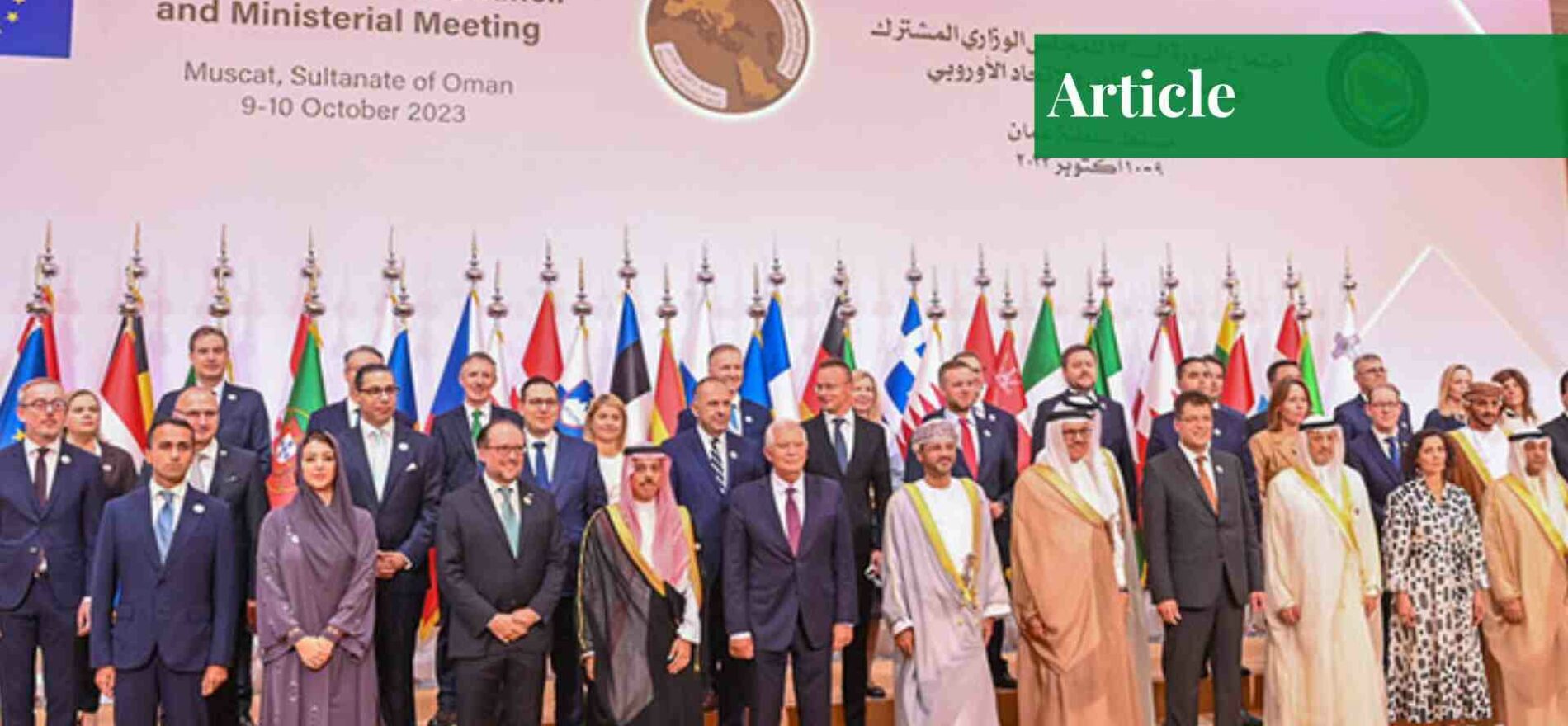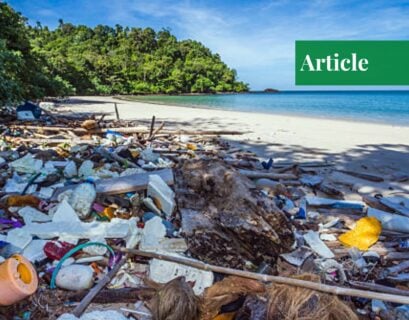Ms Hafiza Syeda Azkia Batool is studying International Relations at the National Defence University (NDU).
Overview
With the Gulf Cooperation Council-European Union (GCC-EU) strategic partnership initially established by the Cooperation Agreement of 1988, the GCC and the EU have made substantial progress in its implementation. The 27th Joint GCC-EU Ministerial Council gathered in Muscat, with Sayyid Badr Hamad Al-Busaidi, the Foreign Minister of Oman, serving as the chair of the session. Sayyid Badr emphasized the need to combat Islamophobia and xenophobia, expressing concerns about the potential incitement of violence, while underscoring the pivotal role of regional organizations like the GCC and the EU in fostering security, prosperity, and economic cooperation.
Proposing specific measures, Sayyid Badr suggested the establishment of an expert group on energy and climate change, increased collaboration on cybersecurity, and the inclusion of GCC students in the EU’s Erasmus Plus overseas study program. He called for prioritizing research and innovation within the GCC-EU partnership. Recognizing the significance of this partnership amidst increasing threats to regional and international peace, security, and the global economy, both parties welcomed the advancements made since their last meeting in Brussels in February 2022.
Echoing Sayyid Badr’s perspective, Josep Borrell, the High Representative of the European Union for Foreign Affairs and Security Policy, highlighted the partnership’s role in promoting regional stability and prosperity. He emphasized the potential global impact of the collaboration, affirming the EU’s readiness to support regional efforts in addressing security challenges in the Gulf region.
Jasem Mohamed Al Budaiwi, the Secretary General of the GCC, emphasized the mutual desire to strengthen cooperation frameworks across various domains. Al Budaiwi reaffirmed the GCC’s commitment to upholding regional stability and security, advocating constructive dialogue and good neighborliness as fundamental principles for strengthening regional relations.
Key Discussion Points
Fostering Economic Integration and Sustainable Development
The 27th GCC-EU Joint Council endorsed the recommendations of the 12th GCC-EU Macroeconomic Dialogue held in November 2022 in Brussels and instructed future dialogues to prioritize strategies for more efficient integration and sustainable business and investment environments.
The Joint Council celebrated the outcomes of the 5th Trade and Investment Dialogue convened in Riyadh in March 2023 and highlighted key areas for collaboration, including the facilitation of economic integration, promotion of renewable energy and energy efficiency, advancements in digital trade, and the cultivation of sustainable and global value chains for fostering an advantageous EU-GCC trade and investment partnership.
The 27th GCC-EU Joint Council further emphasized the significance of joint efforts to strengthen the multilateral trading system, particularly within the framework of the World Trade Organization (WTO). It also noted the positive outcomes of the 12th WTO Ministerial Meeting and anticipated the 13th in Abu Dhabi from 26-29 February 2024 and welcomed talks for an India-Middle East-European Corridor.
Mitigating Climate Change and Environment Protection
The Joint Council underscored the need for collaborative efforts to mitigate climate change, adapt to its impacts, and foster the development of renewable energies and energy efficiency. Recognizing the significance of commitments made at COP27, the Joint Council urged for active participation at COP28 to ensure the fulfillment of these commitments.
It affirmed the importance of fundamental principles embedded within climate agreements, including equity, common but differentiated responsibilities, and the accommodation of diverse national circumstances within the context of the UN Framework Convention on Climate Change and the Paris Agreement.
Moreover, the Joint Council agreed to enhance collaboration on a shared de-carbonization agenda aimed at transitioning their energy systems to a greener state. This entails intensifying technical cooperation, particularly in areas such as hydrogen, energy efficiency, integration of renewable, and the establishment of electricity interconnections, with the ultimate goal of achieving climate neutrality.
The Joint Council admired Saudi Arabia’s Green Middle East Initiative, which includes the establishment of a secretariat and a $2.5 billion allocation for supporting its governance and projects. It further noted the UAE’s initiative addressing global water scarcity and the proposed UAE-EU Global Renewables and Energy Efficiency Pledge at COP28 in Dubai.
Advancing Scientific Research and Space Cooperation
The Joint Council emphasized the potential of GCC-EU collaboration in scientific research and innovation as a catalyst for innovative solutions, job creation, and the resolution of challenges related to green and digital transitions. Recognizing the importance of enhancing GCC countries’ involvement in the EU R&I Framework Programme Horizon Europe, the Council invited other GCC nations to join Mission Innovation or participate in separate missions under this initiative to catalyze actions and investments in research and development.
Additionally, the Council underscored the crucial role of space systems, such as Copernicus Earth observation data and Galileo’s High Accuracy Service, for environmental policy decision-making, urban planning, automotive applications, and space-related collaborations, with potential avenues for cooperation including the European Geostationary Navigation Overlay Service (EGNOS).
Addressing Extremist Ideology and Combatting Radicalization
The Joint Council acknowledged the outcomes of the first GCC-EU Conference on Extremist Ideology and Radicalisation held in Riyadh in June 2023 and encouraged continued cooperation in this sphere. Stressing the importance of tolerance and peaceful coexistence among nations and cultures, the Joint Council acknowledged the potential of hate speech, racism, racial discrimination, xenophobia, and related forms of intolerance, alongside gender discrimination and acts of extremism, in aggravating conflicts.
The Joint Council also agreed to hold a regular and structured regional security dialogue between the GCC and the EU, led by senior officials. They resolved to establish joint working groups as necessary under the security dialogue framework to coordinate efforts on various regional and global concerns. These include issues related to nuclear, missile, and drone proliferation; maritime security; cybersecurity; counterterrorism; terrorism financing, recruitment, and ideology; human trafficking; drug trafficking; irregular migration; organized crime; energy security; security of global food supplies; disaster preparedness and emergency response.
Furthermore, the EU and the GCC Ministers directed their senior officials to explore the potential for GCC-EU coordination regarding the EU’s Coordinated Maritime Presence (CMP) in the North West Indian Ocean. The Council also welcomed the EU’s proposal to organize a high-level forum on regional security and cooperation in Brussels shortly, together with the GCC Secretariat and GCC Member States, to complement the efforts undertaken at GCC-EU official meetings.
Addressing Global Humanitarian Needs
The Joint Council recognized the need for unified efforts to address global humanitarian needs, emphasizing the reinforcing of the initiatives outlined in the GCC-EU Joint Action Program (2022-2027) and strengthening the international humanitarian system to ensure a sustainable and effective response to crises stemming from natural disasters and conflicts.
The Joint Council welcomed the meeting of the GCC Aid Committee and the EU services on 5th September 2023 to establish a structured cooperation for humanitarian aid, including the establishment of a network of focal points, conducting regular meetings, the exchange of best practices and information, and a coordination mechanism between the EU Emergency Response Coordination Centre and the GCC Emergency Management Center.
Emphasizing Iraq’s Commitment to Upholding Kuwait’s Sovereignty
The EU and the GCC Ministers emphasized the vital importance of Iraq’s commitment to upholding Kuwait’s sovereignty and territorial integrity, alongside the necessity of respecting bilateral agreements, international conventions, and UN resolutions, notably UNSC Resolution 833 concerning the delineation of the Kuwait-Iraq boundary.
Stressing the need for complete demarcation of the Kuwait-Iraq maritime boundary, extending beyond boundary point 162, they reiterated the importance of fully implementing the 2012 Kuwait-Iraq Agreement, which regulates maritime navigation in Khor Abdullah.
Commending the recent engagement between the prime ministers of both Iraq and Kuwait to address this issue, the EU and the GCC Ministers reaffirmed their support for UNSC Resolution 2107 (2013) and urged Iraq and the UN to exert maximum efforts to achieve a comprehensive resolution of all the issues at hand.
Promoting Resolution of the UAE-Iran Islands Dispute
The Joint Council reiterated its concern regarding the absence of tangible progress in resolving the dispute between the United Arab Emirates and the Islamic Republic of Iran over the islands of Abu Musa, Lesser Tunb, and Greater Tunb. It reaffirmed its support for a peaceful resolution of the dispute in line with international law, including the UN Charter. The Joint Council emphasized the potential avenues for settlement, including through bilateral negotiations or by referring the matter to the International Court of Justice for adjudication.
Urging Two-State Solution for Israel-Palestine
Reminding all parties of their international humanitarian law obligations, the Joint Council called for restraint and the prompt release of hostages. It urged unobstructed access to vital necessities such as food, water, and medicine.
The EU and the GCC Ministers restated their commitment to a two-state solution, coexisting in the 1967 lines, following the Arab Peace Initiative and pertinent UN resolutions. It stressed the need for increased financial support for UNRWA, the Palestinian Authority, and humanitarian and developmental needs in the occupied Palestinian territory.
Emphasizing Regional Stability and Diplomacy with Iran
The Joint Council appreciated the diplomatic efforts by Saudi Arabia and other GCC states in engaging with Iran for regional de-escalation. Reiterating its support for the Treaty on the Non-Proliferation of Nuclear Weapons, the Joint Council urged Iran to promptly fulfill its nuclear obligations and reverse its nuclear escalation. It also emphasized the critical role of UNSC Resolution 2231 besides urging Iran to cease the proliferation of ballistic missiles, unmanned aerial vehicles, and other armaments that pose serious security threats to the region and beyond.
Stressing Humanitarian Aid and Political Resolution in Yemen
The Joint Council stressed the need to resolve the war in Yemen and reiterated its commitment to the unity, sovereignty, independence, and territorial integrity of Yemen as the Houthis continue to pose a threat to the country’s stability and security.
The Joint Council emphasized its support for an inclusive political process under UN auspices based on the GCC initiative and its implementation mechanism, Yemen’s National Dialogue Conference outcomes, and the UNSC Resolution 2216. It welcomed the efforts of the Presidential Leadership Council to foster peace and ease the suffering of Yemenis while emphasizing the necessity for the Houthis to engage positively with international efforts for a lasting resolution in Yemen.
Emphasizing Inclusive Political Solution for the Syrian Crisis
The Joint Council underscored preserving Syria’s unity, sovereignty, and territorial integrity and ensuring adherence to the UNSCR 2254 (2015). It welcomed the Arab Contact Group’s efforts to resolve the conflict in Syria in a step-for-step manner, consistent with UNSCR 2254, as decided during the Ministerial meetings in Amman on 1st May 2023 and in Cairo on 15th August 2023.
The Council Ministers called for a nationwide ceasefire and stressed the need to create secure conditions for the safe, dignified, and voluntary return of refugees and internally displaced persons consistent with UN standards, and the importance of providing the necessary support to Syrian refugees and countries hosting them.
Upholding Territorial Integrity Amid the Ukraine Conflict
The Joint Council expressed deep concern about the war in Ukraine, which continues to cause immense human suffering. It reaffirmed its respect for the sovereignty and territorial integrity of states, and its commitment to the relevant principles of international law, including international humanitarian law, and the UN Charter.
Addressing Humanitarian Needs in the Horn of Africa and Sudan
The Joint Council acknowledged the distressing humanitarian conditions in the Horn of Africa, highlighting the severe food insecurity and water scarcity faced by 23 million individuals in Ethiopia, Kenya, and Somalia. The presence of nearly five million refugees and 13 million internally displaced persons further compounds the gravity of the situation.
In response to the civil war in Sudan and the resulting humanitarian turmoil, the Joint Council reiterated the necessity of upholding Sudan’s unity, sovereignty, and territorial integrity. It emphasized the urgent need to restore the country’s security and stability while ensuring the continuity of basic public services. The Joint Council also emphasized the pivotal role played by the African Union (AU), the League of Arab States (LAS), and the Intergovernmental Authority on Development (IGAD) in fostering the political dialogue.
Iran’s Reaction to the 27th GCC-EU Joint Council
Iranian Foreign Ministry Spokesperson, Nasser Kanaani, has rejected the statements made in the 27th GCC-EU Joint Council as baseless and reflective of self-interest. Kanaani pointed to the historical interferences of some European nations in the Persian Gulf, along with the lucrative arms trade that perpetuates regional tensions for commercial gains. Regarding territorial disputes, Kanaani reaffirmed Iran’s unwavering stance on the sovereignty of the three Iranian islands of Abu Musa, the Greater Tunb, and the Lesser Tunb, considering them an integral part of Iranian territory.
Furthermore, he dismissed the EU’s concerns about Iran’s nuclear activities and defense capabilities, asserting that Iran consistently complies with international laws and obligations under the Comprehensive Safeguards Agreement (CSA) with the International Atomic Energy Agency (IAEA). Hence, Kanaani emphasized that Iran’s military and defense capabilities are aimed at enhancing deterrence, safeguarding national security, and promoting regional stability.
If you want to submit your articles, research papers, and book reviews, please check the Submissions page.
The views and opinions expressed in this article/paper are the author’s own and do not necessarily reflect the editorial position of Paradigm Shift.


















